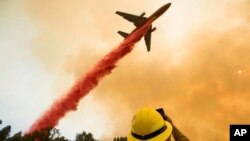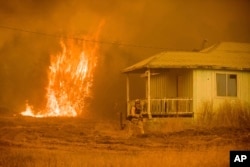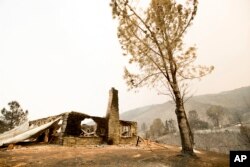Steve Valdez was back at work Saturday at a hardware store, days after his home and those of his neighbors were incinerated in a gigantic wildfire that swept through a rural area of California near Yosemite National Park.
“This is a hardware store in a small town. There are people out there who depend upon us to get power, to get water, to get their equipment fixed,” said Valdez, a clerk at Coast Hardware Do It Best in Mariposa. “They’re getting stuff to get by.”
More than 3,000 firefighters are battling the blaze that has forced almost 5,000 people from homes near Yosemite National Park in Central California. The fire has burned more than 100 square miles (259 square kilometers).
The aggressive wildfire sweeping through the Sierra Nevada foothills covered with dense brush and dead trees has destroyed 60 homes and 64 other buildings. It spared Mariposa, a historic Gold Rush-era town but burned homes nearby.
Fire’s growth slows
The blaze that erupted July 16 scorched nearly 118 square miles (305 square kilometers) of trees and grass and continued to threaten about 1,500 homes, but its spread had slowed drastically.
“They are still out in front of an uncontrolled fire but the fire isn’t moving at 30 mph, the fire is crawling along,” fire spokesman Brandon Vaccaro said.
Nearly 4,500 firefighters, air tankers and fleets of helicopters and bulldozers fought the blaze by chopping firebreaks and dumping rivers of water and fire retardant.
The blaze fed on long grass that sprouted from a wet winter along with brush that had been stricken by five years of drought and trees killed by a beetle infestation.
In some places, the flames were so fierce that “every bit of vegetation is gone and you’re down to the scorched earth,” Vaccaro said.
The fire grew by up to 30,000 acres a day at its peak, but by the weekend the growth rate was down to about 1,000 acres a day despite dry, blistering weather, he said.
The blaze, moving northeast, was 40 percent contained but it could take another two weeks for firefighters to fully surround it, Vaccaro said.
Yosemite in a haze
The smoke blurred the scenic vistas of Yosemite National Park, about 35 miles west of the fire. Tourists expecting the grandeur of falls and granite peaks instead saw hazy gray silhouettes.
Ken Welsh, 60, of New Zealand said he had been prepared to be “blown away by a Technicolor dream” at Yosemite.
He shrugged his shoulders and headed back to the car.
“It leaves a lot to the imagination, doesn’t it?” he told the Los Angeles Times.
Mariposa coming back
At its peak, the blaze forced about 5,000 people to evacuate. Some roads remained closed, but Mariposa, with a population of about 2,000, was coming back to life.
People were coming into the hardware store for plumbing parts and electrical cords a day after evacuations were lifted.
Valdez said he decided to work even though his 4,400-square-foot home was among those destroyed.
“Older people know that everything heals,” said Valdez, 60. “Everything gets better if you just keep plugging away.”
Home gone, owner philosophical
Valdez and his wife had 20 minutes to grab a few photographs, bills and some family Bibles before they fled the encroaching flames. For a couple of days, they lived in their car and truck with the windows rolled up because ash was falling like snow, he said.
Valdez finally managed to return briefly to his neighborhood to find — nothing. His home of 17 years was gone, except for the fireplace. Five other houses also were destroyed.
Valdez was philosophical. The insurance company quickly stepped in and he plans to rebuild. Senior citizens on limited incomes and those without insurance are far worse off, he said.
At his age, Valdez added, he has learned to cope with hardship.
“There are young people who are ... mentally destroyed,” he said. “Those people are the people to feel sorry for.”
The fire was one of more than a dozen that have ravaged California in recent weeks.











